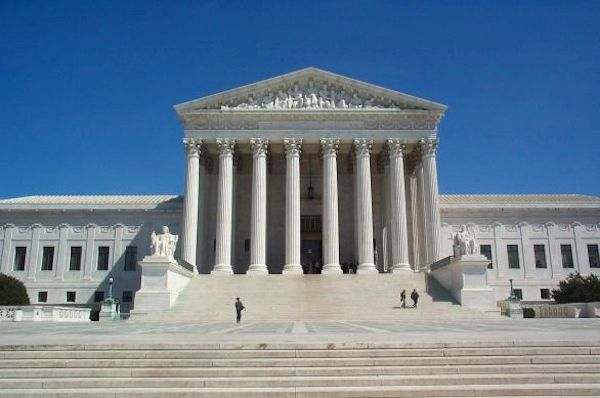Supreme Court Remains Silent on Same-Sex Marriage Appeals


Currently, a number of same-sex marriage cases are pending before the Supreme Court. The issues brought before the justices include equal consideration for homosexual couples who are legally married under state law, but cannot receive some of the benefits heterosexual couples are guaranteed under federal law. The court could also take up California's Proposition 8 and either uphold or strike down the 9th Circuit Court of Appeals' ruling on the 2008 ballot referendum.
The decision on which appeals, if any, the justices on the high court will hear was expected on Friday, but it didn’t come. Analysts then speculated that the court could announce its decision on Monday, but the justices still have not decided to hear any of the cases. The Supreme Court remains silent on the issue, but its indecision thus far should not be interpreted as a complete refusal to hear any of the appeals.
The issue of racial segregation in schools was left pending before the high court for a number of years before the court decided to hear Brown v. Board of Education of Topeka in 1953. The case is now considered one of the most important landmark decisions in the history of the Supreme Court.
Just as racial equality was the civil rights issue of the 50s and 60s, the issue of marriage equality is considered by many to be the civil rights issue of the current decade.
Nationwide polls suggest that the American perspective on the issue is gradually shifting and the percentage of Americans who believe same-sex marriage should be legal has significantly risen in the last twenty years. The decision to hear any of the five appeals on the issue of marriage equality would alone be considered a landmark decision.
As the priorities of modern society change, it seems the idea of “traditional family values” has fallen by the wayside. It is not a simple thing to define what is “traditional” because the concept of what marriage and the family unit means in society has shifted to various degrees with each generation.
Most people who argue for the “traditional” definition of marriage seldom realize that such an argument is full of gaping holes. When one defines marriage, it should not just be defined by who should be allowed to enter into the union, but what kind of union it is.
For most of history, marriage was a socioeconomic and/or political institution. The decision to get married was based more on the current socioeconomic status of those involved and had more to do with the people around the couple than the couple themselves. Love was an inconsequential idea compared to economic prosperity within one’s own socioeconomic class.
This is the traditional definition of marriage and during this time, and for a greater portion of human history, both parties in a marriage were not considered equal. In modern American society, however, men and women are equal and have the same opportunities available to them.
Marriage, for the most part, is no longer an institution that is needed for socioeconomic prosperity and, as a result, is no longer a high priority for many. Some couples seek to live in domestic partnerships without entering into the civil institution of marriage and a growing number of people place professional and personal obligations over finding a marital partner. Therefore, some people question the relevance of the “traditional marriage” argument.
Most people opposed to same-sex marriage rely on an argument based on a moral structure typically originating from religious ideas. However, morality is a subjective construct. Societal and moral values shift with each new generation and many Americans believe that government should not favor one set of moral principles over another.
The number of people in the United States that accept same-sex relations is growing. Three states passed ballot referendums to legalize same-sex marriage during the 2012 elections. Wisconsin voted in the first openly gay member of the US Senate. As the times change, so does the attitude of the American people. Gallup poll results indicate that the number of Americans who believe gay and lesbian relations are morally acceptable has risen sixteen percentage points in the last decade alone.
While the Supreme Court has remained silent on the appeals dealing with this issue, it is likely it will eventually take up at least one of the cases dealing with the Defense of Marriage Act (DOMA) and its constitutionality. This would set a legal precedent for the other appeals dealing with DOMA and the high court would essentially rule on the federal government’s role in defining marriage.



